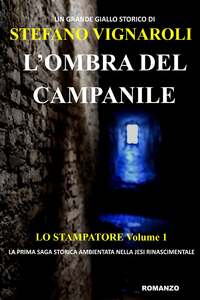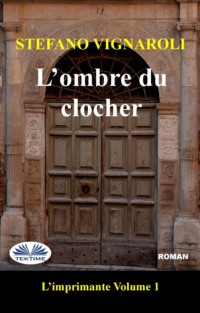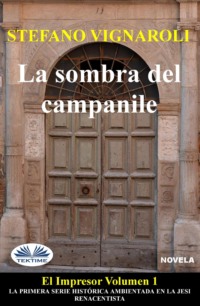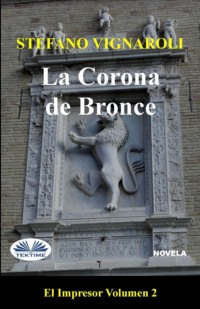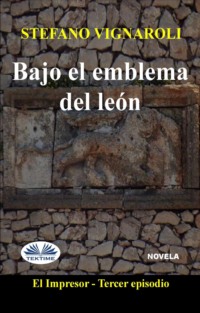
Полная версия
The Bronze Crown

To Giuseppe Luconi and Mario Pasquinelli,
illustrious citizens who are
part of the history of Jesi
Amici di Jesi
Stefano Vignaroli
THE BRONZE CROWN
The Printer – second episode
©2017 Amici di Jesi
©2020 Tektime
All reproduction, distribution and translation rights are reserved
The pieces on the history of Jesi have been taken and freely adapted from the texts of Giuseppe Luconi
Illustrations by Prof. Mario Pasquinelli, courtesy of the legitimate heirs
Translation by Fatima Immacolata Pretta
Website http://www.stedevigna.com
Email for contacts stedevigna@gmail.com
THE BRONZE CROWN
The Printer – second episode
Translated by Fatima Immacolata Pretta
NOVEL
PREFACE
Jesi, the birthplace of Emperor Frederick II of Swabia, returns being the stage of the adventures of the young scholar Lucia Balleani, in the second episode of the trilogy The Printer. Love and death, esotericism and reason, good and bad. These are just some of the ingredients that give rhythm to this new investigation, focused on the mysterious disappearance of the bronze crown, once placed above the rampant lion of the main of Jesi palace, that of the Signoria. With skilful alchemy, Vignaroli intertwines past and present, through the parallel events of the protagonists of the present day and of the homonymous ancestors. An attractive lady and haughty regent of the Aesina republic, Lucia Baldeschi is divided between the obligations of reason of state and the love for the fugitive knight, the brave leader Andrea Franciolini.
Between history and legend, the action ranges from the severe buildings and the dark secret passages of a subterranean Jesi, to the open countryside of its earldom, populated by shepherds and monks by day and animated by magical rites during the moonlight. Then there are the palace intrigues, the feuds between the lords, and the battles: those among armies and against pirates, from Urbino to Senigallia, up to some of the most suggestive gorges of the Apennines. Places and distinctive features of an era, the sixteenth century, characterized by lights and shadows, divided between the cult of reason and the practice of esotericism and of which the characters of the novel are the faithful mirror. In demeanour, as well as in strengths and weaknesses. In their footsteps, between sensational discoveries and brilliant intuitions, the quarrelsome lovers, Lucia and Andrea, of the twenty-first century Jesi will come to the truth in the sign of timeless love.
Marco Torcoletti
PREMISE
After the first episode of the series “The printer”, here I am to present you the sequel, the second story. At the end of “The shadow of the bell tower” I had deliberately left several windows open to possible developments of the next plot. Bernardino, the printer, lies in desperate conditions in a room in the Santa Lucia hospital. Cardinal Baldeschi has died suddenly and has left the city government vacant. Will young Lucia Baldeschi finally take the reins of the government and prevent Jesi from falling into the hands of enemies who have always been pressing? Of course, she cannot leave the government in the hands of four corrupt nobles or, worse, entrust it to the papal legate sent by the Pope. But Lucia is a woman, and it is not easy to assume roles of power, traditionally entrusted to men. And what will happen to Andrea, her love, after escaping the gallows and having vanished in the wake of Mancino? Will he return to the scene to help his beloved? Or will controversial events lead him to other shores?
And we also have to remember the parallel story, that of the scholar Lucia Balleani, our contemporary, who perhaps has finally found the love of her life, which will lead her by the hand to discover together with the reader new secret arcana.
In short, the elements are all there, to face a reading that will again lead us through the alleys, squares and palaces of a splendid city in the Marche region, famous throughout the world for being the birthplace of Emperor Frederick II: Jesi. Enjoy the reading!
Stefano Vignaroli
CHAPTER 1
Bernardino had reopened his eyes after days and days of unconsciousness. Though the room was in the semi-darkness, he was dazzled by the light and white of the room. A small, bare room with white walls, no paintings, no frescoes on the ceiling, not even the company of a shelf with books. He thought he had already arrived in Paradise, but the excruciating pains he felt all over his body made him realize he was still alive. Hearing him complain, a nun approached him and brought him a cup of chicken broth to his lips, which until then had forced him to swallow despite his unconsciousness. Though cold, Bernardino swallowed it with greed, until it went through him and started coughing. But he grabbed the nun’s arm again, which was pulling the precious liquid away from him, as he felt his throat so burnt, that he thought he had come out of that hell of flames only a few minutes before. But it had been almost a month since the day his shop burned down.
«You are still weak, my friend. Little by little, or there’ll be trouble. The Doctor recommended a few sips and often. And Doctor Serafino is a good man, otherwise you wouldn’t be with us at this hour!», the nun told him kindly, but in a firm voice.
«The Cardinal, it was the Cardinal...», Bernardino tried to say, with his voice choking between new coughs.
«Yes, yes, it was Cardinal Baldeschi who wanted you to be cured in this place, thanks to the intercession of his dear nephew. Unfortunately, the Cardinal is no longer here. A disgrace, a horrible disgrace. The Cardinal was killed, by one of his servants from what I know, a certain Mira. She made him fall from the balcony of his study, after stabbing him with a very sharp knife. Rumour said that the Cardinal caught the girl stealing from his study. A fight broke out between the two of them and the old man got the worst of it. But the servant girl was arrested, and will pay for her sins. Ah, she’ll pay!»
Despite his pains, Bernardino grabbed the nun’s hand and made a superhuman effort to talk to her.
«Are you telling me that Cardinal Artemio Baldeschi is dead? Is it true? But... how long has it been since I lost consciousness? From the way you speak, it doesn’t seem to be yesterday or the day before yesterday. And what about Lucia Baldeschi? From what you tell me, she must have been left alone!»
«Stay calm. I told you, but you mustn’t make any effort! You spent a month on this bed, in the grip of fever, delirium, dreams that gripped your soul and your heart. My sisters and I were desperate for you. And instead, the good Lord has not yet welcomed you into His house, and you are still among us. I will send a message to Lucia Baldeschi, telling her that you have regained consciousness. She will be very happy and will certainly come to visit you the next few days.»
«Sister, send for her at once. Palazzo Baldeschi is just across the street, in this very square. I can even see it from my window!»
The nun smiled and withdrew her hand, still held by Bernardino’s hand.
«For her safety, the Lady withdrew to the family’s country residence, near Monsano, with her daughters and their tutors. The Pope has already appointed a new Cardinal, who is arriving from Rome. Since it is not known what ideas she has, Countess Lucia prefers to stay away from the city for the moment. Consider that Jesi is in complete disarray! We no longer have either civil or religious authority, and we could be easy prey to enemies, both internal and external. So I consider the noble woman’s decision to protect herself and her daughters to be wise. We must not forget that her betrothed, Andrea, is still in circulation and could come at any moment to claim his seat as Captain of the People, as well as the hand of the noble Baldeschi.»
«After all, he would have every right. The title of Capitano del Popolo1 belongs to him and his blood runs in little Laura’s veins», Bernardino said, with his voice almost starting to clear up.
«You’ve only just recovered and already you can’t keep your damn mouth shut? Don’t say heresies! Wasn’t it enough to escape the flames once? Do you want to end up in the fire again?» the nun replied ironically, going to close the window shutters and plunging the room into darkness. «Rest now, for you need it!»
«Just one thing, Sister. I have the urge to urinate. How can I do it? I’ll never get up from here!»
«How do you think you’ve been doing all these days? Just relax. We’ve applied a hose, which conveys your moods directly into a jar under the bed.»
Bernardino let go of the urine, marvelling at how in fact there was a strange odour in the room, due to the medicines and the poultices they had applied to his burns, but there was no smell of excrements at all. And he must have made some in a month that he was lying in bed!
While he could remember nothing of the delusions and dreams of the previous days, from then on Bernardino’s rest was constantly agitated by nightmares, dreams and visions, which he himself, in his awake sleep, could hardly distinguish from reality. Now he saw himself surrounded by flames, now he felt protected in Lucia’s gentle arms. Only now did he realize that it was she who had rescued him, who had saved his life. He saw her clearly above him before he lost consciousness. And he would have expected to see her next to him as soon as he opened his eyes again. But every time he woke up, he found himself in the same half-light room, helpless, unable even to lift himself. The only human presences were the nuns, now one, now another, who took turns at his bedside, sprinkling him with ointments and poultices and trying to make him swallow the usual broth. There seemed to be no other food in that hospital than that. Only once had he sensed the presence of the doctor next to him, a gruff man with thick white hair and lace of the same colour. He had put his ear to his chest and said: «In three days we’ll try to get him up. Despite his age, this man is a rock. He has a more tenacious heart than mine. Tomorrow we can give him a visit from the noble Baldeschi. Just a few minutes, sister! We mustn’t tire him out. Too much excitement could still be fatal to him.»
The printer felt asleep again, due to the medicines administered to him to relieve the pain. And this time he dreamed of being at work again in his printing house, completely rebuilt and renovated, more beautiful than before. And he dreamed of giving good advice to his noble lady friend. And he dreamed of seeing her on the People’s Captain bench, in the Hall of the Best in the Palazzo del Governo. And he dreamed the children, Anna and Laura, playing and chasing each other in the park of a sumptuous country residence, while he watched them like a caring grandfather.
When, re-emerging to reality from one of his countless troubled dreams, he realized that next to his bed was the noble Lucia, he had the impression that all the pain had suddenly disappeared and he was regaining his strength. So much so that he managed to lift himself up a little, while Lucia, with a loving rather than charitable gesture, placed a pillow behind his back so that he was more comfortable, while allowing him to maintain that position.
«Tell me you are not a dream, my Lady!» said Bernardino, with his voice interrupted by coughing.
He felt Lucia’s hands looking for one of his own to hold her, giving him an unexpected feeling of warmth, which gave him a new strength. He lifted himself even more with his back, among the protests of the nun who threatened to immediately interrupt the visit. Bernardino did not perceive the nun’s nod to Lucia, but the result was evident, because the nun was silent, or rather he withdrew from the room, leaving the two friends free to talk to each other.
«I’m glad you’re recovering, Bernardino. You don’t know how much, at this moment, I need you and your advice. The Cardinal is dead and the situation in the city is very difficult. It seems that the Pope was sending a new Bishop and the choice had fallen on the elderly Cardinal Ghislieri, of Jesi’s origin. He was supposed to take the reins of both the Church and the city government, but... But he never got to Jesi.»
«Why?» asked Bernardino, intrigued.
«Unfortunately, Leo X came suddenly to death in the past few days.»
«But, he was only forty-six years old!»
«Exactly, many believe he was poisoned. Giovanni De’ Medici was too close to his family, to the Lords of Florence, for the ecclesiastical oligarchy to accept him. And now, pending the election of a new Pope, the Cardinals gathered in conclave in Rome are dividing the territories between them. It seems that as linked of the Holy See for our city, without prejudice to the rights and privileges of the municipality, Cardinal Jacobacci has been appointed.»
«But, Jacobacci is linked to the worst fundamentalist faction of the Guelphs.»
«Indeed, but even of this Jacobacci we have not seen the shadow here in Jesi. And meanwhile, after the sack of 1517, misery rages in the countryside and the city. And it seems that the plague has come to Ancona, and I don’t think it will be long before it reaches us.»
«Listen to me, Lucia! Take the reins of government in the city. You have every right to do so. Don’t worry about being a woman. Call the Jesi’s nobles together. They’ll be happy to help you. And place a crown over the rampant lion on the facade of the Palazzo del Governo. It will remind everyone that Jesi is a royal city and that it will be governed independently of the Church. If the Cardinal arrives late, it’s his loss. When he arrives he will think about religious matters, while the Civil Government will be of the people, as it must be.»
«Are you instigating me to stir up a rebellion?»
«No, I’m just saying you have to take responsibility. And take your rightful place. There is no other solution!»
CHAPTER 2
I was sick, and you didn’t come to visit me...
(Gospel according to Mark 6:56)
At the sight of another black smoke, the Camerlengo could not refrain from puffing. After the death of Leo X, Giovanni De’ Medici, it was more than a month since the Cardinals were gathered in conclave, locked in rooms where only he could have the freedom to enter and exit as he wanted. The fact is that, precisely by virtue of this privilege of his, he had well understood that the high prelates had no intention of electing the new Pope, if they had not previously resolved among themselves the issues concerning the division of lands and feuds. The Bishop of Florence, Cardinal Giulio De’ Medici, was not at all convinced that the death of his relative had occurred due to natural causes, and he launched into long and protracted discussions about his suspicions regarding a hypothetical poisoning of the deceased Pope and the probable perpetrators of the plot. All to try to convince the majority of his colleagues to vote for him as the new pontiff. And so, between one vote and another, between one black smoke and another, not a few hours but sometimes even more than a whole day passed.
When he saw the smoke, the Camerlengo arranged everything so that the Cardinals would be adequately refreshed. He would send some servants to set a table in a large empty hall and, when everything was ready, he would chase the servants away and open the door to the rooms where the Conclave took place. In fact, no one but him could speak with the Cardinals, so that they were in no way influenced in their choices.
Innocent Cybo was immediately appointed Camerlengo at the death of Leo X, because he was his right hand man, the one who had been closest to him and who knew well how to administer the State of the Church in that period of vacancy of the highest authority. He had seen the usual familiar faces arrive, Cardinals of whom he knew life, death and miracles, vices, virtues and ambitions. He had immediately realized the absence of an important figure, Cardinal Artemio Baldeschi of Jesi. Someone had then told him that Cardinal Baldeschi had died in tragic circumstances, perhaps following a fight with a servant girl in his palace.
Something unheard, one has to hear everything nowadays, had thought between himself Innocent. Once the maids offered their young bodies to their Lord and kept silent. Today they even have the audacity to rebel! Of course, if Baldeschi is no longer here, Jesi and his county are an attractive land of conquest for many of those present here.
And in fact, the question of the assignment of the Episcopal Curia of Jesi was one of the first that had to deal with the Camerlengo as a substitute of the Pope. He decided that the best thing was to appoint a Cardinal who would not take part in the conclave, so he could leave immediately for those lands troubled by years of struggles, wars, betrayals and misgovernment, which had led the population, especially in the countryside, to a state of considerable misery and where, lately, it seemed that the terrible disease known as the plague was also spreading. The choice fell on Cardinal Jacobacci, who left Rome immediately, but who, having arrived at Orvieto, his native land, stopped there to enjoy a period of rest in his native places, which was perhaps prolonging a little too much. But someone said that the Cardinal had lost his head over a local maiden, and would not have left there for anything in the world.
Gualtiero Jacobacci hadn’t lost his head over any maiden, neither young nor old. He had paused to admire the splendid façade of the Duomo, not yet finished, and had longed for those places where he had lived his childhood. In his life he had never seen the cathedral free of scaffolding. He knew that construction had begun over two hundred years earlier, but now the boxes were only left on the façade to allow artists to complete the refined decorations that would embellish it and make it famous in the centuries to come. He took advantage of the fact that the Episcopal Curia was free, as Cardinal Alessandro Cesarini, Bishop of Anagni and Orvieto, was in forced retreat in Rome to participate in the conclave, and was hosted by the local ecclesiastical community, also beginning to celebrate Holy Mass inside the unfinished cathedral. Everything had in mind, in short, except to reach Jesi, the seat that had been assigned to him by the Camerlengo. The fun would not last long, since sooner or later the new Pope would be elected and Cardinal Cesarini would return to the seat. But Gualtiero didn’t want to think about it. Carpe diem, he said to himself, making Horace’s quotation his own. Let’s seize the moment and enjoy this fine period. When the time comes, we’ll see what to do! Maybe, when the time comes, I could propose to Alessandro Cesarini an exchange: me here and him in Jesi. Jesi, like the entire Ancona region, is a sought-after seat for a high prelate. The countryside is known for its richness and the Church wants at all costs to bring those territories back under its wing in a definitive way, giving a cut to the old legacies of Municipalities, Lordships and local Nobility. An ambitious man like Cesarini will certainly not be able to say no to my offer. And I’ll be able to enjoy old age in my home country.
Finally, after more than a month of black smoke, on January 9, 1522 the white smoke came out of the fireplace. The Camerlengo breathed a sigh of relief and rushed inside the wing where the conclave was held to perform his ritual duties. It seemed to him that an eternity had passed since the day Leo X died. He had found him lying on the table where he was eating. He had called the guards and had the body reassembled in bed, then he had beaten the Holy Father’s skull with a hammer, to make sure that the body no longer responded with any reflection, neither voluntary nor involuntary. When the limbs, legs and arms became stiff, he had called the Pope three times with the baptismal name: «John... John... John!». Having received no reply, he had officially declared the Holy Father dead. He had the funeral chamber set up and organized the funeral rite, at the end of which Pope Leo X would join his predecessors in the basement of the basilica built above the tomb of St. Peter. After that he had summoned the Conclave, but he realized that his position was considered very uncomfortable by a certain faction of the participants in the assembly, those closest to the De’ Medici family. He had always been the Cardinal closest to the Pope, but notoriously he was part of the same family as Giovanni Battista Cybo, who had occupied the papal throne until 1492 under the name of Innocent VIII. The evil tongues, since he was responsible for the Pope’s safety and all the food that arrived on the Holy Father’s table had to be approved by him, had suggested that he himself might be responsible for the unexpected and premature death of Leon X. In fact, he may well have poisoned the food, with the intention of aspiring to the pontificate and bringing a member of the Genoese family back to the highest office. Innocent knew very well that he was innocent and that he had not perpetrated any conspiracy against his beloved Pope. John De’ Medici had suffered from heartbreak since he was a boy, and for this very reason he never devoted himself to arms. So no one had poisoned him, he had collapsed and died a natural, albeit sudden, death. The fact of becoming a Camerlengo had partly removed suspicion from him, as he would not be eligible as Pope, but not entirely. Giulio De’ Medici and three or four other Cardinals continued to look at him in doggedness, but he responded to those provocations with the best of defences: silence. Of course, those weeks hadn’t been easy, but he had never been able to stand up to his enemies. Not a word had ever come out of his mouth, whether he accused the Medici of envy or of careerism. He continued to do his duty as if nothing had happened. But now, as he climbed the stairs with his breath down his throat, the fear that the Medici would be the new elected one was gripping him. He was convinced that he would somehow avenge the untimely death of his family’s member. And already Innocent imagined himself with his head resting on a stump waiting for the axe that, with one blow, would make it fly away from the rest of his body. When he opened the envelope where the name of the new pontiff was written, he drew the second sigh of relief in a few minutes.
The Camerlengo looked out onto the terrace overlooking the square below and shouted, with what breath he had in his throat, to the faithful who were waiting curiously:
«Nuntio vobis gaudium magnum! Habemus Papam, eminentissimum et reverendissimum dominum Adrianus Florentz, qui sibi imposuit nomen Adrianus sextus.»
Rumours and acclamations rose from the square below, waiting for the new Pope to show up and speak to the crowd of the faithful. While Innocent was helping the new Pope to put on the sacred vestments of the rite, thoughts flowed fast in his mind. This Adriano VI won’t last long, before someone from the De’ Medici family gets their hands on it. But whether it lasts a month, a year or a century, no one can accuse me. From tomorrow, Innocent Cybo returns to Genoa.
Like all the others, Cardinal Alessandro Cesarini packed his bags to return to his home in Orvieto. When he arrived on March 4 of the year of our Lord 1522, he was a little bewildered by the fact that his bishopric had been arbitrarily occupied by his colleague, but when he heard the latter’s proposal he could hardly believe his ears. He who would have made false cards to have the Episcopal Curia of Jesi, left vacant by Cardinal Baldeschi, if he saw it offered on a silver platter by those who had been chosen as its owner, only because it was linked to the places where he had spent his childhood. Incredible, but true! An opportunity not to be missed! Having sealed the pact with Jacobacci, Alessandro Cesarini, eager to rest for a few days, sent a messenger to Jesi, to announce his arrival and his settlement to the city authorities. The messenger arrived in Jesi only on March 12th, and the General Council of the City, meeting for the occasion in the Main Hall of the Palazzo del Governo and presided over by the nobleman Fiorano Santoni, took note of the appointment - even if Cardinal Jacobacci would have been more welcome - and also decided to give Cesarini a life annuity of 25 florins per month. All this when the Cardinal was already at the gates of the city, so he was not even in time to prepare a worthy welcome for the new Bishop, who found himself entering a city completely indifferent to his arrival. Cesarini was not only disappointed with the welcome, but also and above all with the fact that he found the city and the countryside in very different conditions from what he had expected. After the sack suffered by the city in 1517, there followed a few years of bad governance by Cardinal Baldeschi, who had reduced the area to conditions of misery never seen before in living memory. In addition to the damage and harassment that had been brought by the invading armies, the plague had returned as a nightmare to terrorize the population. And so Cesarini, who still had many interests in the area of Anagni and Orvieto, soon began to spend most of his time away from Jesi, citing as an excuse his nagging ecclesiastical commitments at the Papal See, and leaving in his place harsh vice-governors, who knew only how to be cruel and tyrannical towards the population.


